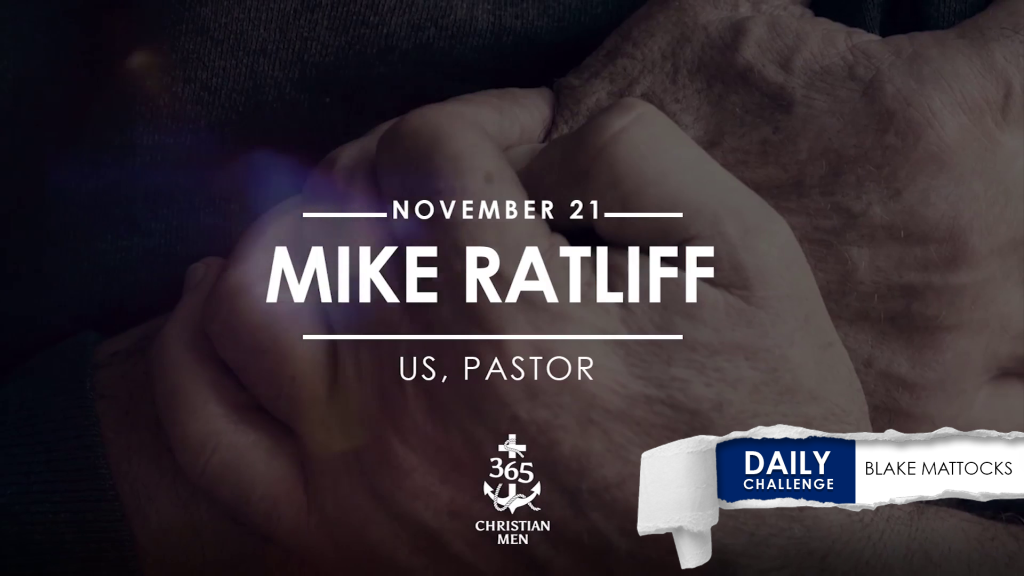November 21. Mike Ratliff. Today’s story is about the time back when Mike was 37 years old. He was a loving and conscientious pastor who spent his time and his prayer caring for others. Then this happened.
Anxiety doesn’t mean your faith is weak. It means you have work to do.
Mike was in a deep sleep when he was suddenly jolted awake. His heart raced. The air was stifling. His breath felt like it was being pulled from his lungs, and he gasped to get it back. A terrible sense of doom hovered over him, and his mind felt overwhelmed with fear.
Mike felt like he was going to die at any moment, and he raced outside in the middle of the night. Settling on his porch, he forced the fresh air into his lungs. Though he had felt the panic before, it never came on him as strong as that night. He had never felt such an impending sense of doom that overtook all his senses and demanded relief now.
The next day, he saw a doctor who diagnosed him with panic disorder. The doctor said Mike had had a nervous breakdown.
Panic attacks? Anxiety? Nerves? He had rarely even thought such words. It was 1992, and he was a pastoral leader in the church. Men like him didn’t have problems like that; he was the one who helped others with their problems. What would his fellow church-goers think if they knew the man they saw at the pulpit struggled like this? He was a man of faith, not fear!
But the doctor could see that—despite his faith and love for God—fear was plaguing Mike. He reminded Mike the panic he was feeling wouldn’t kill him or make him stop breathing, but it was still a serious issue. One that warranted a visit to the psychiatrist.
Mike agreed, desperate to feel like his normal self again. After some tests and talks, Mike learned that he also had some depression. But the psychiatrist repeated what Mike’s family doctor had said. The panic wouldn’t last forever. It wouldn’t kill him or make him stop breathing, despite how he felt during an attack.
But the psychiatrist went one step further. He asked Mike if he wanted to overcome the anxiety.
Of course, Mike said, “Yes.” He wanted the panic attacks to stop.
The psychiatrist prayed with Mike at each session and told him to remind himself daily that he had the strength to overcome the panic. Even though others in his family struggled with panic, Mike still had the strength to fight the fear.
Mike had to tell himself, “I know what this is. I’ve been through this before, and it’ll pass. It won’t last forever.” Mike repeated those words daily, even on days he didn’t have panic attacks. The psychiatrist also gave him some temporary medications to help with the fight, and he continued sessions with the doctor to check on his progress.
“You can conquer it,” the psychiatrist said.
And Mike was determined to conquer it.
Recovery became a daily practice—not always easy. But within time, relief began to show. After two months, the anxiety lessened. Within five months, Mike was no longer on medication. Within six months, Mike was anxiety-free.
For 13 years, the panic had been gone. But in 2005, it returned. Mike had another panic attack. At first, he dreaded feeling the terrible anxiety again. He didn’t want to repeat his experiences from more than a decade before. But he remembered his old routine. “I overcame it before,” Mike told himself. “I can overcome it again.”
He repeated the same words he did before. Once again, the panic went away.
Mike’s struggle with panic disorder wasn’t easy to overcome. And a lot of people didn’t understand how he felt or how he could feel such fear despite being a man of faith who loved God. But Mike learned that feeling anxiety didn’t mean his faith was weak.
Rather, his faith gave him the strength to overcome anxiety. He and his psychiatrist had prayed before his sessions, and he was reminded that even though he was getting medical help, his faith could work along with the doctors.
“Faith requires work on our part,” Mike said. And his victory over anxiety led him to a new ministry that went past the pulpit and into the classroom. Because Mike had struggled with panic attacks, he was able to relate to others who suffered and to help them overcome their anxiety and other mental-health disorders. Mike spent years working as a counselor.
“Cast all your anxiety on him because he cares for you” (1 Peter 5:7 NIV).
Do you see any signs of anxiety in your life? If so, what is the next step in dealing with it? Anxiety doesn’t mean your faith is weak. It means you have work to do.
Based on an interview with Mike Ratliff, July 17, 2019.
Story read by: Daniel Carpenter





